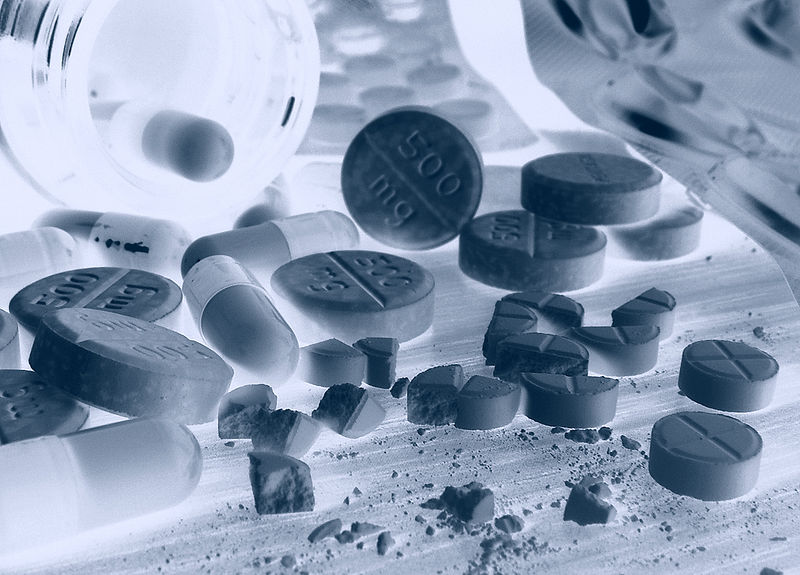If I use the phrase "addicted to makeup," I'm usually referring to how uncomfortable I feel going out in most social situations without the stuff. The reasons I'm uncomfortable are a post of their own, but they boil down to the same old story: feeling as though what I'm bringing to the table isn't quite good enough; wanting to conceal "flaws." There are plenty of other reasons I wear makeup—and I'm pleased to report those reasons are generally more positive or at least less of a psychological downer—but as far as using the word addicted, that's what I mean. More important, that's how I most often hear it when others use the word.
Reading this interview with Cat Marnell—the beauty editor at xoJane whose extraordinarily candid pieces on her ongoing experirences with drugs are painful, provocative, and radically subjective—prompted me to wonder if there are other forms of makeup addiction. "I'm bad all of the time, and beauty products are fixing me," she told a reporter from New York. "Without beauty products, I would have never gotten through my life. I owe everything to them. They've afforded me unlimited debauchery." The interview took place on the eve of her entering rehab, heavily suggested (mandated?) by her employer; she was apparently high during the interview. "Unlimited debauchery" in that context means something different than it might to a casual user. To be blunt, it means something to be concerned about, not something to slap a extra coat of blush over.
I don't have any personal experience with drug or alcohol addiction, Two-Cocktail Makeovers being about as much of a party gal as I get. But I do know that makeup and other forms of artifice took on added responsibility when I was at my worst with my eating habits, particularly with bingeing: I'd feel so gross the day after a binge that while on one hand I wanted to disappear, I also felt like if I was going to be able to look anyone in the eye, I'd need to look as stellar as I could even if I felt sluggish and uncomfortable because of what I'd done to my body the night before. That's actually why I picked up daily eyeliner in 2009 after years of only wearing it on special occasions; it made my eyes pop, something I'd cling to as proof of normalcy when my eyes sans liner were puffy from poor nutrition.
Now, I still wear makeup almost daily—including that eyeliner that I picked up to help camouflage my problem—and, in fact, I wear more of it than I did during that time. It's not the amount of makeup that's the problem; it was the motivation. I can't say that I'd have sought help any sooner if I didn't have the mask of makeup available to me—but I know that my feelings about makeup shifted when I was at my worst. I went from approaching makeup as something almost businesslike to something desperate. And not to minimize eating disorders in the least, but in my case my problem was neither as physically damaging nor as physically evident as it is for the average drug addict.
I don't want to speculate about Marnell herself, or her experience with addiction. My thoughts here are prompted by the interview with her, but her mental health isn't the point of this post, and I'm not trying to say any of my musings here apply to her. But I'm wondering if experiencing makeup as a much-needed tool to cover one's tracks, even a sort of pass into "unlimited debauchery," is a common experience with drug users. I also wonder if it changes contextually—if women who are into a sort of "glamorous" drug scene (blah blah drugs aren't glamorous, but you know what I mean) would be more prone to treat makeup as a part of the entire experience of drug use than women whose addiction wouldn't resemble a documentary of Studio 54. And what about high-functioning addicts—can cosmetics play a key role for women whose livelihoods depend upon maintaining a drug-free image?
My experience with alcoholics and drug addicts has been limited but painful, and one thing I've taken away from various relationships with addicts is that they are fantastic liars. Makeup itself isn't a lie, but part of its intended function is concealment. In order to get sober, addicts need to stop lying—to others, to themselves. I'm wondering if there are times that makeup actually becomes an integral part of an addict's lie, to the point where an extended sobriety—or permanent abstinence—from it would be beneficial. And at the same time, I'm guessing that if there are female addicts who might take something from "makeup sobriety," there are just as many who would reap the benefits of other intended functions of makeup: self-expression, play, pride. It's hard enough for most of us to know why we wear makeup. I imagine that reentering the world without the numb cushion of using would make it even harder.
